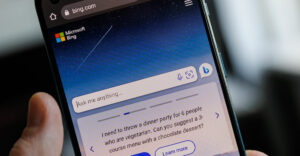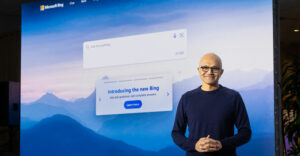
Google CEO Eric Schmidt sees mobile devices augmenting our human existence in the future.
Speaking at the TechCrunch Disrupt event this week, he outlined a vision in which mobile phones will autonomously conduct searches for us, and we’ll never be lonely or bored because we’ll always be able to get in touch with friends or access content or entertainment online.
This future will eventually be available to billions of people around the globe, Schmidt said. However, it will require more sharing of personal information, and that could raise concerns about privacy and data encryption, issues Schmidt only touched on in passing.
Was Schmidt really outlining the road we will travel with technology in the future? Or was he just engaging in the pie-in-the-sky visionary act CEOs routinely pull out when participating in forward-looking events such as Disrupt? Will the competition be content to sit back and let Google essentially create a pocket universe of its own?
The Day After Tomorrow
Schmidt’s vision is one in which the computer’s symbiosis with people will fulfill all their requirements.
Cloud-based services will push information autonomously about their surroundings to peoples’ mobile devices as they walk down a street so they don’t have to conduct a search, Schmidt said. People will never be lonely or bored because they can always go online to find friends or entertainment.
That vision might be eventually realized, Andrew Eisner, director of community and content at Retrevo, told TechNewsWorld.
“I think Schmidt’s acting in the role of a visionary and presenting some very intriguing visions of how things will work in the future,” Eisner remarked. “The question is, are we talking about the near future or the distant future?”
Belief Seems to Be the Hardest Word
“This takes me back to the 1970s — there was that song ‘In the Year 2525’ by Zager and Evans,” Laura DiDio, principal at ITIC, told TechNewsWorld. That song paints a dystopian future in which machines do everything for humankind.
Further, Schmidt’s vision sounds quite Google-centric.
“Did he forget about a couple of little companies called Facebook and Apple?” DiDio asked.
“Well, if you look at the nature of this [TechCrunch Disrupt] conference, it’s where speakers are probably competing for the most outlandish ideas,” Al Hilwa, a research director at IDC, told TechNewsWorld. “Having said that, Google is always looking for the next big thing,” he pointed out.
Microsoft has been active in the natural language business “for some years” and is using natural language and artificial intelligence to evaluate the intent of search and relevant results, Eisner pointed out.
Yusuf Mehdi, senior vice president of Microsoft’s Online Audience business, who oversees Redmond’s Bing search engine, has already pooh-poohed Google Instant, which is perhaps one of the technologies that’s a first step toward Schmidt’s vision of the future.
Google Instant lets Google’s search engine refresh search results on the fly while users type in their queries. Mehdi, who spoke at TechCrunch Disrupt on Wednesday, reportedly said the service is technologically impressive but overloads users with information.
“It’s easy to make pie-in-the-sky predictions and say, ‘We’re going to have this, we’re going to have that, and oh yeah, world peace is there too,’ and everyone’s happy,” Jim McGregor, chief technology strategist at In-Stat, told TechNewsWorld.
“If CEOs want to be seen as visionaries, that’s fine, but real changes take three to five years to come about, and they’re associated with changes in the market, changes in the industry and changes in technology,” McGregor said.
Only the Lonely
Will the ability to connect with friends online or get rid of boredom by finding content or entertainment online really be as effective as Schmidt contends?
DiDio isn’t buying into that vision.
“Even though we’re connected to everybody else digitally, I don’t think that’s going to obliterate loneliness,” DiDio pointed out.
Perhaps that isolation will increase the anomie sometimes experienced in modern urban society. The term ‘anomie’ means the breakdown of social norms and values, which leads to alienation and a sense of purposelessness.
Isolation might also lead to more social problems and physical ailments due to the lack of physical human contact. How might isolation affect people who depend solely on their online friends?
Baring It All to Google
Such services would likely require that consumers disclose even more personal information to Google than they already have. This will let Google better target its services, Schmidt said. He reportedly described ongoing debates about privacy and data encryption as “healthy” because these issues need to be resolved.
He should know — several European governments are clamping down on Google because they contend its Street View mapping service invades people’s privacy. The Czech Republic earlier this month banned Google from continuing its service in that country.
“Requiring that level of information will trigger a backlash,” In-Stat’s McGregor warned. “We’re already seeing a level of concern.”
Another problem with Schmidt’s vision is that it could cause even more security problems than we have now.
“When you have all that information in software, someone’s going to hack it and we’re going to have a disaster happen that will change the way we look at security and the way we look at the Internet,” McGregor said. “We’ve gone from free sex in the 1960s to free information now.”





















































Too many people are concerned with pushing ads at consumers. That’s not semantic, and it’s definitely not pull. Plus it makes the Web top-heavy with everyone trying to jump into the ad revenue model game. (Same type of thing happened with the stock market almost a decade ago.) Giving away personal and confidential information is not only unnatural, but flat out ignorant. Undoubtedly some people won’t mind giving away their info, but then what’s it worth anyway? I see hacking, spam, . . . nothing good about autonomous search.